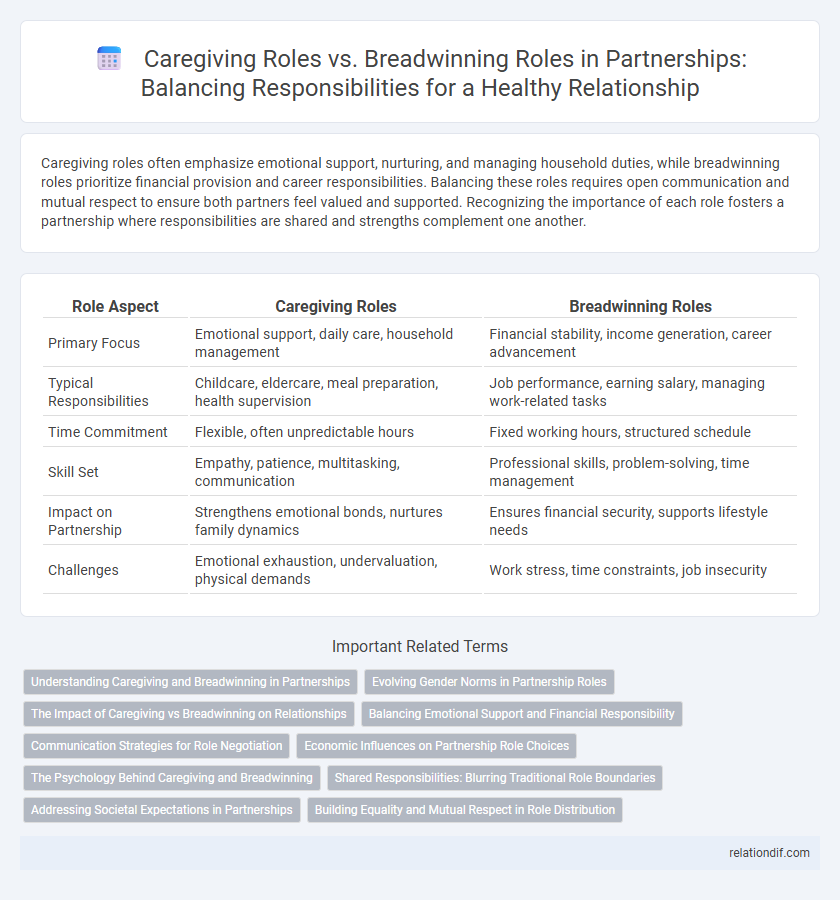Caregiving roles often emphasize emotional support, nurturing, and managing household duties, while breadwinning roles prioritize financial provision and career responsibilities. Balancing these roles requires open communication and mutual respect to ensure both partners feel valued and supported. Recognizing the importance of each role fosters a partnership where responsibilities are shared and strengths complement one another.
Table of Comparison
| Role Aspect | Caregiving Roles | Breadwinning Roles |
|---|---|---|
| Primary Focus | Emotional support, daily care, household management | Financial stability, income generation, career advancement |
| Typical Responsibilities | Childcare, eldercare, meal preparation, health supervision | Job performance, earning salary, managing work-related tasks |
| Time Commitment | Flexible, often unpredictable hours | Fixed working hours, structured schedule |
| Skill Set | Empathy, patience, multitasking, communication | Professional skills, problem-solving, time management |
| Impact on Partnership | Strengthens emotional bonds, nurtures family dynamics | Ensures financial security, supports lifestyle needs |
| Challenges | Emotional exhaustion, undervaluation, physical demands | Work stress, time constraints, job insecurity |
Understanding Caregiving and Breadwinning in Partnerships
Caregiving roles in partnerships involve providing emotional support, managing household tasks, and nurturing family members, which are essential for maintaining relational stability and well-being. Breadwinning roles focus on earning income and financially supporting the household, directly impacting economic security and resource allocation within the partnership. Balancing caregiving and breadwinning roles requires clear communication and mutual recognition of each partner's contributions to create a harmonious and sustainable relationship dynamic.
Evolving Gender Norms in Partnership Roles
Caregiving roles and breadwinning roles within partnerships are increasingly overlapping as evolving gender norms challenge traditional distinctions. Studies indicate that couples now share parenting and financial responsibilities more equitably, reflecting a cultural shift toward gender equality. This transformation fosters greater partnership satisfaction and economic resilience by balancing emotional labor and income generation.
The Impact of Caregiving vs Breadwinning on Relationships
Caregiving roles often foster emotional intimacy and mutual support, strengthening relationship bonds through daily acts of nurturing and attentiveness. Breadwinning roles contribute financial stability but may introduce stress and time constraints, potentially limiting quality interactions between partners. Balancing caregiving and breadwinning responsibilities is crucial for maintaining relationship satisfaction and mitigating conflicts related to role expectations.
Balancing Emotional Support and Financial Responsibility
Balancing caregiving roles and breadwinning roles requires addressing both emotional support and financial responsibility within partnerships. Effective communication and shared decision-making foster an equitable distribution of caregiving duties and income generation, reducing stress and promoting mutual well-being. Prioritizing empathy alongside financial planning ensures partners meet each other's emotional needs while maintaining economic stability.
Communication Strategies for Role Negotiation
Effective communication strategies are crucial for negotiating caregiving and breadwinning roles within partnerships, ensuring clarity of expectations and mutual support. Open dialogue about individual strengths, workload capacity, and emotional needs fosters understanding and equitable role distribution. Regular check-ins and active listening help partners adapt to changing circumstances, reducing conflict and enhancing collaboration in role sharing.
Economic Influences on Partnership Role Choices
Economic influences significantly shape caregiving and breadwinning roles within partnerships, with income disparities often determining role allocation. Financial stability pressures drive shifts toward dual-income households or primary breadwinning by one partner while the other assumes caregiving responsibilities. Labor market conditions, wage gaps, and access to childcare resources critically impact decisions surrounding role distribution in intimate partnerships.
The Psychology Behind Caregiving and Breadwinning
The psychology behind caregiving roles involves empathy, emotional labor, and nurturing behaviors, often linked to oxytocin release and stress regulation. Breadwinning roles activate goal-oriented cognition, problem-solving skills, and dopamine-driven reward systems related to financial provision and status. Understanding how these psychological drivers shape identity and interpersonal dynamics helps partners balance responsibilities and foster mutual respect.
Shared Responsibilities: Blurring Traditional Role Boundaries
Shared responsibilities in caregiving and breadwinning roles foster equality by blurring traditional gender boundaries in partnerships. Couples increasingly balance financial contributions and household care, promoting mutual support and reducing stereotypical pressures. This shift enhances relationship satisfaction and economic stability by aligning duties with individual strengths rather than fixed societal expectations.
Addressing Societal Expectations in Partnerships
Caregiving roles often align with traditional expectations that emphasize emotional support and household management, while breadwinning roles prioritize financial provision and career advancement. Addressing societal expectations in partnerships requires redefining these roles to promote equity, allowing partners to share responsibilities based on skills and preferences rather than gender norms. Research indicates that partnerships with flexible role distributions report higher satisfaction and resilience in managing work-life balance challenges.
Building Equality and Mutual Respect in Role Distribution
Balancing caregiving roles and breadwinning responsibilities fosters equality by recognizing the value of both contributions within a partnership. Clear communication and mutual respect ensure that role distribution aligns with individual strengths and preferences, minimizing imbalance and enhancing relationship satisfaction. Emphasizing shared responsibility cultivates a supportive environment where both partners feel equally valued and empowered.
Caregiving Roles vs Breadwinning Roles Infographic

 relationdif.com
relationdif.com